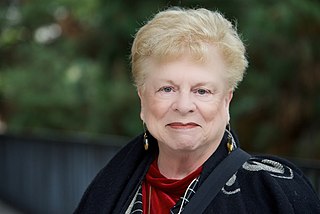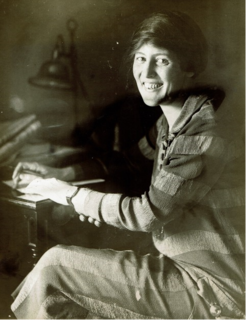Related Research Articles

Anna Freud was a British psychoanalyst of Austrian-Jewish descent. She was born in Vienna, the sixth and youngest child of Sigmund Freud and Martha Bernays. She followed the path of her father and contributed to the field of psychoanalysis. Alongside Hermine Hug-Hellmuth and Melanie Klein, she may be considered the founder of psychoanalytic child psychology.

Clinical psychology is an integration of science, theory, and clinical knowledge for the purpose of understanding, preventing, and relieving psychologically-based distress or dysfunction and to promote subjective well-being and personal development. Central to its practice are psychological assessment, clinical formulation, and psychotherapy, although clinical psychologists also engage in research, teaching, consultation, forensic testimony, and program development and administration. In many countries, clinical psychology is a regulated mental health profession.
The Menninger Foundation was founded in 1919 by the Menninger family in Topeka, Kansas. The Menninger Foundation, known locally as Menninger's, consists of a clinic, a sanatorium, and a school of psychiatry, all of which bear the Menninger name. Menninger's consisted of a campus at 5800 S.W. 6th Avenue in Topeka, KS which included a pool as well as the other aforementioned buildings.
David A. Rapaport was a Hungarian clinical psychologist and psychoanalytic ego psychologist.
The Anna Freud Centre is a child mental health research, training and treatment centre located in London, United Kingdom. The Centre aims to transform current mental health provision in the UK by improving the quality, accessibility and effectiveness of treatment, bringing together leaders in neuroscience, mental health, social care and education. It is closely associated with University College London (UCL) and Yale University. The Duchess of Cambridge currently serves as its royal patron.
Jennifer S. Lerner is an American experimental social psychologist known for her research in emotion and decision theory. She is the first psychologist at the Harvard Kennedy School to receive tenure. At Harvard, her titles include Professor of Public Policy and Management, Professor of Psychology, Faculty Director in the Graduate Commons Program, Co-Founder of the Harvard Decision Science Laboratory and Co-Director of the Harvard Faculty Group on Emotion, Decision Making, and Health. Her research interests include the effects of accountability on judgment and choice. She founded and directs the Leadership Decision Making program within Harvard Kennedy School's executive education program.
Feminist psychology is a form of psychology centered on social structures and gender. Feminist psychology critiques historical psychological research as done from a male perspective with the view that males are the norm. Feminist psychology is oriented on the values and principles of feminism.
Judith V. Jordan is the co-director and a founding scholar of the Jean Baker Miller Institute and co-director of the institute's Working Connections Project. She is an attending psychologist at McLean Hospital and Assistant Professor of Psychology at the Harvard Medical School. She works as a psychotherapist, supervisor, teacher and consultant. Jordan's development of relational-cultural therapy has served as a foundation for other scholars who have used this theory to explore the workplace, education. leadership and entrepreneurship.
Danielle Knafo is an American clinical psychologist, psychoanalyst, and author. Born in French Morocco and raised in Pennsylvania she is now a professor of psychology and psychoanalysis. She is a prolific author, and a popular speaker. She is also a professor at LIU-Post in its clinical psychology doctoral program. She writes and lectures on many subjects, including creativity, trauma, psychosis, sexuality and gender, and technology.
Louise Bates Ames was an American psychologist specializing in child development. Ames was known as a pioneer of child development studies, introducing the theory of child development stages to popular discourse. Ames authored numerous internationally renowned books on the stages of child development, hosted a television show on child development, and co-founded the Gesell Institute of Child Development in New Haven, CT.

Jeremy David Safran was a Canadian-born American clinical psychologist, psychoanalyst, lecturer, and psychotherapy researcher. He was a professor of psychology at the New School for Social Research, where he served for many years as director of clinical training. He was also a faculty member at New York University's postdoctoral program in psychoanalysis and The Stephen A. Mitchell Center for Relational Studies. He was co-founder and co-chair of The Sandor Ferenczi Center at the New School for Social Research. In addition he was past-president of The International Association for Relational Psychoanalysis and Psychotherapy.
Nancy McWilliams, Ph.D., ABPP., is a Visiting Full Professor at the Graduate School of Applied and Professional Psychology at Rutgers University. She has written on personality and psychotherapy.
Reiko Homma True is an internationally known Japanese American psychologist. True is Professor Emeritus of Psychology at Alliant International University in San Francisco, CA. She is recognized for her efforts to advance mental health services for Asian Americans and other minorities. She conducts research studies examining mental attitudes and status among minorities in the community, and publishes her research in reputable psychological journals.
Polly Young-Eisendrath is an American psychologist, author, teacher, speaker, Jungian analyst, Zen Buddhist, and the founder of Dialogue Therapy and Real Dialogue and creator of the podcast Enemies: From War to Wisdom.
Josephine Rohrs Hilgard was an American developmental psychologist, psychiatrist, and psychoanalyst. She was a clinical professor in the Department of Psychiatry at Stanford Medical School. She conducted research on mental health and developed the theory of "anniversary reactions", which described how psychiatric issues might be triggered at anniversaries of significant events in a patient's life. She also specialized in hypnotherapy, and published research on the theory and practice of hypnosis.
The Greater Kansas City and Topeka Psychoanalytic Center and Institute, also known as the Greater Kansas City Psychoanalytic Center and Institute (GKCPI), is a psychoanalytic center in Kansas City, Missouri, that comprises several interrelated organizations. Currently these are the Kansas City Psychoanalytic Foundation, the Greater Kansas City and Topeka Psychoanalytic Center (GKCTPC), and the Greater Kansas City Psychoanalytic Institute (GKCPI), also known as the Foundation, the center, and the institute. In the early 2000s, the Greater Kansas City Psychoanalytic Institute merged with the older Topeka Psychoanalytic Society.

Oliva Maria Espín is a Cuban American counseling psychologist known for her pioneering intellectual contributions to feminist therapy, immigration, and women's studies, and her advocacy on behalf of refugee women to help them to gain access to mental health services. Her interdisciplinary scholarly work brings together perspectives from sociology, politics, and religion to further understanding of issues and barriers related to gender, sexuality, language, and race. She is in the vanguard of transnational psychology, that applies transnational feminist lenses to the field of psychology to study, understand, and address the impact of colonization, imperialism, and globalization. She is the first Latina Professor Emerita of Women’s Studies at San Diego State University.
Rachel Thies Hare-Mustin was an American clinical psychologist, known for her strong passion for social justice, civil rights, pacifism, and gender equality. As a scholar, she was known for her research in feminist postmodern theory, gender issues, and professional ethics, and for clinical application of feminist theory to family therapy.

Lillian Comas-Díaz is an American psychologist and researcher of multiethnic and multicultural communities. She was the 2019 winner of American Psychological Association (APA) Gold Medal Award for Life Achievement in the Practice of Psychology. In 2000, she received the APA Award for Distinguished Senior Career Contribution to the Public Interest.

Isabelle Kendig was a prominent clinical psychologist in the mid-20th century United States. She was best known as Head Psychologist at St. Elizabeths Hospital in Washington DC. In that role she was part of a cohort of senior clinicians that helped guide the expansion of clinical psychology in the post-WWII era. She also qualified as a member of the second generation of women psychologists in the U.S.
References
- ↑ About Archived 2008-06-16 at the Wayback Machine . Harriet Lerner, Ph.D. Retrieved on 2008-06-07.
- ↑ Harriet Lerner from HarperCollins Publishers. Retrieved on 2008-06-07.
- ↑ Garvey Lecture Series at Friends University. Friends University. Retrieved on 2008-06-07.
- ↑ Harriet Lerner, PhD" Health care speaker Archived 2008-04-17 at the Wayback Machine . Speakers on Healthcare. Retrieved on 2008-06-07.
- ↑ "PAPERBACK BEST SELLERS: May 21, 1989". The New York Times . May 21, 1989. Retrieved 2008-06-07.
- ↑ Franny B. Kranny. There's a Bird in Your Hair! Archived 2008-05-19 at the Wayback Machine . Harriet Lerner, Ph.D. Retrieved on 2008-06-07.